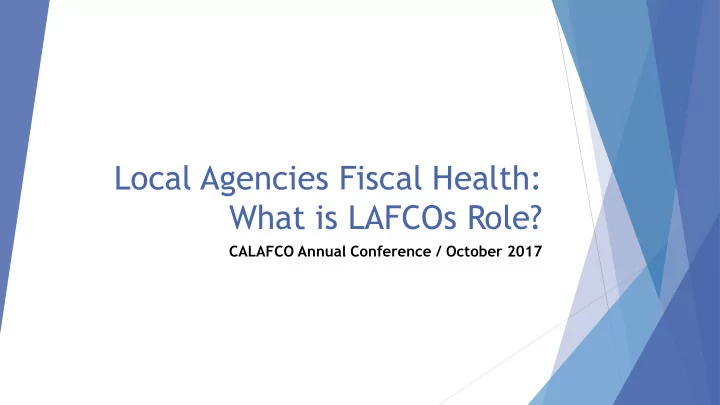

Local Agencies Fiscal Health: What is LAFCOs Role? CALAFCO Annual Conference / October 2017
About the Session Local governments in California are facing severe financial strain due to a number of reasons Many special districts and cities may face dire consequences in the next economic downturn LAFCOs are positioned to react to such consequences, but can more be done to avert them? CALAFCO Annual Conference 2
Panelists Jim Simon, Principal – RSG Andrew Belknap, Regional Vice President – Management Partners Joone Lopez, General Manager – Moulton Niguel Water District Marlene Best, City Manager – City of Santee CALAFCO Annual Conference 3
Introduction Local Agencies Fiscal Health: What is LAFCOs Role? CALAFCO Annual Conference 4
What’s the Problem? CALAFCO Annual Conference 5
What’s the Problem? CALAFCO Annual Conference 6
What’s the Problem? CALAFCO Annual Conference 7
The Problem is Revenues Can’t Keep Up! Property tax increases coming from VLF shift and an unsustainable real estate recovery Many still struggling without redevelopment dollars, overall less coming into the city and will get much worse in the next few years as RDAs wind-down Contract service cost inflation exceeds revenue growth by 2-3x in many cities Unfilled positions, deferred maintenance, salary cuts of 10% in 2017 New cities are not feasible, unincorporated areas particularly hit hard CALAFCO Annual Conference 8
What is the Cause of the Financial Strain? Increasing Services and Demands Maximizing Tax Increases Retirement Costs Local Government Tax Structure Taxable Retail Threats Redevelopment Inefficiencies Political Expectations CALAFCO Annual Conference 9
How might all of this affect LAFCOs? How do your MSRs address these issues? Potential of disincorporation, bankruptcies Decreases in level of service particularly in poorer areas of state Pressures from communities to incorporate, even when not feasible Perpetuation of sprawl without a viable long-term municipal service solution Encounter resistance from cities and districts to annex CALAFCO Annual Conference 10
2017 CALAFCO Conference Local Agency Sustainability and the MSR Process October 26, 2017 Andrew S. Belknap, Regional Vice President
This Presentation • The stark and challenging fiscal situation faced by many local governments in California • The solutions required and how LAFCO duties can illuminate opportunities • The solution set includes; sharing or consolidating service delivery for economies of scale, demonstrating accountability and transparency to build support for revenue measures or service delivery changes • LAFCOs are important both at the front end, to identify opportunities, and at the back end for implementation
Pension Costs Are Rising Drastically • Now at 7% earning assumption…down from 7.75% • CalPERS will consider further reductions in Feb 2018 • Experts have advised everything from 3.8% to 8%, a CalPERS advisor recommended 6.2%
These Costs are Growing Faster than Basic Revenues • Pension costs, along with, OPEB costs and basic labor costs are projected to exceed revenue growth in many agencies • 80% of local government costs are for labor • Less services, fewer public employees and need for revenue increases are a probable result
Revenue Gap Between Expectations and Reality Faces Most • Agencies have not recovered from Great Recession revenue losses • Large gap between past expectations and current reality • Without cuts, spending was on track to continue on pre-recession trend line • Revenue gap to continue next 50 years (according to Government Accountability Office report on state and local government fiscal outlook, 2015) 2,337 local revenue measures placed on ballots since 2005 73% approved
Many Local Agencies are Facing Serious Long Term Deficits Even With Fewer Employees
OK it is a Bad Situation: What are the Solutions and How do they Involve LAFCO and the MSR Process • The solutions involve: Finding other service delivery approaches which reduce costs Explaining local government economics in a credible and transparent manner to maximize support for revenue increases • LAFCO MSR Determination Areas are uniquely attuned to this effort; consider the wording of CHK “Adequacy of public services” “Financial ability to provide services” “Shared services and facilities” “Accountability and operational efficiencies”
Some LAFCOs are Moving to Illuminate Fiscal and Service Issues in the MSR Process • In the December 2015 Santa Clara LAFCO City Service Review the Executive Officer and Commission melded determination criteria to the determination areas for this purpose • Sample determination criteria: Shared services, facilities and staff; duplication of services or facilities and excess capacity Anticipated service level deficiencies, and Financial metrics aimed at gauging the ability to provide services Multiple quantitative service level statistics for municipalities
Santa Clara County Fiscal Metrics • Operating General Fund deficit and surplus trends for the past five years • Balanced General Fund budgets using one-time revenues, deferred expenditures or borrowing • Unreserved General Fund reserves as a percent of operating expenditures • Unfunded pension liability • Debt and debt ratios • Liquidity as measured when comparing cash and short-term investments over current liabilities for FY 2014 • Timeliness and accuracy of financial reporting by ensuring that the State Controller’s Financial Transactions Report was filed on a timely basis and that the CAFR received a clean opinion and was issued within six months of the fiscal year’s end
Potential Solutions which can be Illuminated • There are substantial economies of scale in many municipal services Dispatch and call taking Fleet (especially heavy equipment) Library services Emergency medical Wastewater and water treatment Specialized police and fire units Plan review Workers compensation Code enforcement cost recovery Specialized management • But LAFCOs have to choose be involved and provide leadership for many reconfigurations, from facilitating inter-local agreements to annexations and consolidations
Joone Lopez, General Manager MNWD Marlene Best, City Manager - Santee What is happening in your jurisdiction? How healthy is your community long term? What are your ideas or suggestions for improving the financial health of struggling local agencies? Is this an area that LAFCO’s are needed by cities and special districts? Why can’t these entities fix these matters themselves? What special role can LAFCOs play? What kinds of things that LAFCOs are doing that aren’t as helpful? CALAFCO Annual Conference 21
Recommend
More recommend